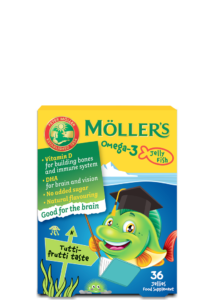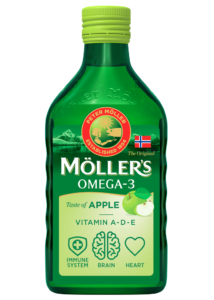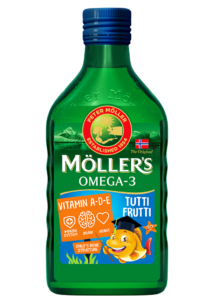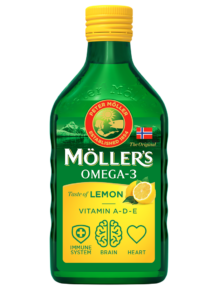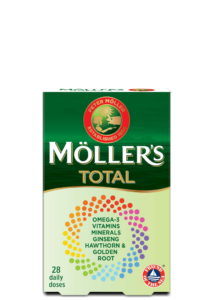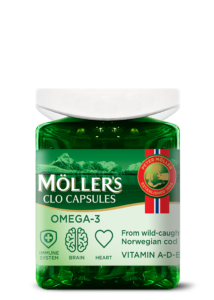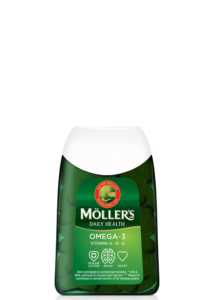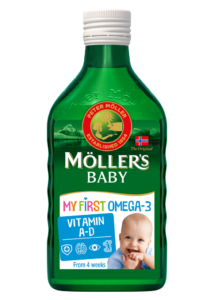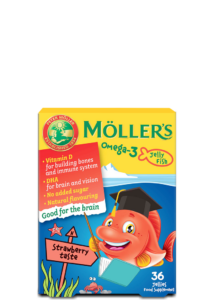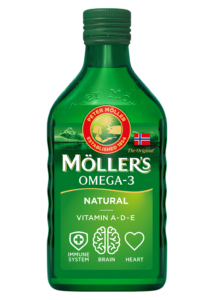Confused about all the warnings regarding foods that can harm your developing foetus? The list of potential hazards will never end for anxious expectant mothers. Here we’ve separated fact from fiction, including some strange ones about fish and omega 3.
Home » Fish, omega-3 and other foods in pregnancy – myths and facts

Omega-3 makes you bleed more during birth – MYTH!
It has been said that the omega-3 fatty acids may prevent blood from coagulating properly and that this can pose a danger during childbirth. But studies show that this is not supported by facts. On the contrary, the health benefits of omega-3 far outweigh this theoretical risk. The essential omega-3 fatty acids in fatty fish, such as mackerel, sardines and herring, contribute to normal brain and eye development in the foetus.
You should start taking folate when you start planning to get pregnant – FACT!
The NHS advises women to start taking a daily supplement of 400 micrograms of folate when they are still planning to become pregnant. This is to prevent spina bifida in babies.
Half a glass of red wine is fine even though you are pregnant – MYTH!
Perhaps half a glass doesn’t have any negative effect on your child. But why take the risk? Remember that everything you consume is shared by the tiny body inside you, which is all too precious to expose to any risk. There is no safe lower limit for alcohol during pregnancy. You should always avoid alcohol during pregnancy and cut down considerably if you’re trying to get pregnant.
You must be more strict with food hygiene when pregnant – FACT!
To make sure that stored food doesn`t infect you with things like toxoplasma and listeria, it’s wise to be extra-strict with hygiene in the kitchen during pregnancy. Always rinse fruit, vegetables and berries. Wash knives and cutting boards frequently and keep your kitchen counters clean. Rinse and hang up your kitchen towel after use and replace it with a clean one frequently. Hot food should be steaming hot, because bacteria grow in lukewarm food. Most bacteria die at temperatures above 70 ° C If it’s a while before cooked food is to be served, it’s better for it to cool down and be reheated again. Raw and cooked foods should be kept apart. Change equipment between different types of foods (e.g. meat, fish and vegetables), and between raw and cooked food – or wash utensils well between each task.
It’s dangerous to eat fish when pregnant – MYTH!
The long list of fish to stay away from when you’re pregnant may make it seem as if all fish are dangerous. Greenland halibut heavier than three kilograms, pike, perch over 25 cm, trout over one kilo, char over one kilogram and fresh tuna are just some of the fish on the avoid list. But there are many other types of fish left, and it’s just as important to ingest the healthy ingredients in fish during pregnancy.
Pregnant women should not eat sushi – MYTH!
Pregnant women can eat sushi made with fresh fish, while avoiding fish types from the list above. Just be sure that sushi comes from a place that is clean with good food hygiene routines.
You can prevent allergies in your child by avoiding certain foods during pregnancy – MYTH!
There is no scientific basis for the belief that pregnant women can prevent allergies this way. However, it seems that a full, varied diet during pregnancy can have a positive effect on a child’s health later in life.
Pregnant women should be cautious about supplements – FACT!
If you take supplements, you can risk getting too much of certain nutrients, especially if you take multiple types. Beyond folate and any other recommendations given to you by your doctor, you should rather concentrate on getting your nutrients through food instead of supplements. If you are still taking supplements, make sure you follow the dosage indicated on the package, and do not take several different types that contain the same vitamins and minerals.
For a complete list of foods to avoid during pregnancy, see the NHS dietary guidelines for pregnant women.
Source: NHS; medscape.com; Food Standards Agency
What is good health?
Do you have a good lifestyle?
Lifestyle simply means the way in which you live. Health and lifestyle go hand in hand. You might feel you have a good lifestyle if you are physically active, eat healthily and generally experience a sense of wellbeing. Conversely, if you want good health you should also have a good lifestyle.
Physical activity is the major contributor to a good lifestyle, but diet, drugs, stress, sleep and social conditions are also play an important role. Being able to use the body properly to avoid injury also affects lifestyle. Physical activity can also prevent depression and help you to recover more quickly from mental illness, both of which obviously affect your lifestyle.
Diet can be a difficult topic for many. Perhaps you eat too much or too little or maybe you find it hard to know what foods to combine to have a balanced diet. It’s also important to eat food that contains important vitamins, minerals and dietary fibre, omega-3 and antioxidants. On top of all this, you also need to get enough energy, protein and the correct fatty acids. The requirement for these nutrients changes throughout your life. When you are older you also have different requirements than children and younger adults. Women also have different requirements than men. Pregnant and breastfeeding mothers also have special requirements.
When you get older, you lose muscle mass and your body requires less energy and therefore less food. You may lead a less active life than you did before, which is why you require less food. However, your need for minerals, vitamins and other nutrients remains the same. Of course, there are plenty of healthy and active older people, but when you reach 70 to 80 years of age, it’s easier to become ill, especially during flu season.
Some steps you can take to improve your lifestyle and health are to:
- eat a healthy and varied diet
- stay active
- watch your weight
- avoid too much alcohol and don’t smoke
- get enough sleep
- think positive
- practise good hygiene
What is good quality of life?
The World Health Organisation (WHO) defines quality of life as a state where the individual can realise their potential, cope with normal stressful situations, work in a rewarding and positive way, and be able to contribute to others and society.
Quality of life is a wide and somewhat diffuse concept that includes joy in, and a desire for, life. These are values that are rather felt than measured, which in turn are based on personal environment and choices. Quality of life doesn’t necessarily depend on being healthy or sick. It’s the moments between worries, sorrows, problems and ailments that matter. For example, if you have a chronic illness, a feeling of mastery can be important when talking about quality of life.
To sum up, quality of life is a combination of health, lifestyle, networks and social support. It’s about experiencing joy, meaning in life, satisfaction, security and a sense of belonging, as well as being able to use your strengths. It’s also about feeling interest in life, coping with everyday situations and a being committed to something or someone. If you have good quality of life, you will be able to cope better with the inevitable stressful situations in life.
Our products
Möller’s Omega-3 Jelly Fish Cola
Möller's Omega-3 Jelly Fish Tutti Frutti
Möller’s Cod Liver Oil Apple
Möller’s Cod Liver Oil Tutti Frutti
Möller’s Cod Liver Oil Lemon
Möller's Total
Möller's Cod liver oil capsules
Möller’s Daily Health
Möller's My First Omega-3
Möller’s Omega-3 Jelly Fish Strawberry
Möller’s Cod Liver Oil Natural
Learn more
Exercise program for the elderly
Healthy Aging Healthy Bones
Healthy diet during pregnancy
Brain Healthy Aging
Good health, lifestyle and quality of life – What does it all mean?
Cod Liver Oil Healthy Aging
Get inspiration on our Instagram
This error message is only visible to WordPress admins
There has been a problem with your Instagram Feed.

